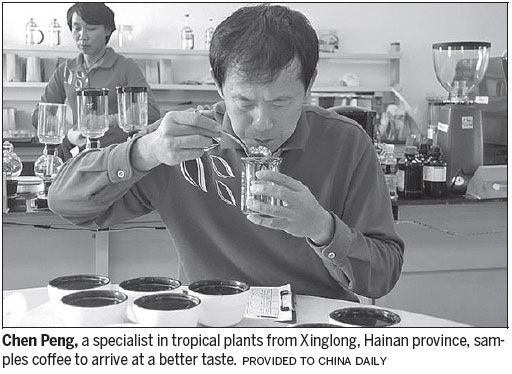Every morning, the aroma of brewing coffee drifts across Xinglong, a small town in southeastern Hainan that boasts more than 180 coffee bars. This means the town, with its 30,000 population, has the highest density, per head, of coffee bars in China.
"Long before Starbucks swept the world, people in Hainan, China's only tropical province, were starting the day with a cup of coffee, popularly nicknamed "old daddy's tea," said Chen Peng. Chen knows the subject, is a specialist in tropical plants and has worked for more than 20 years at the Spices and Beverages Research Institute under the China Tropical Agricultural Plants Research Institute based in Xinglong, the home of the country's first State-run coffee farm.
Xinglong coffee, once graded as "world-class" by coffee lover and former premier Zhou Enlai, has been designated as the official coffee beverage for the Boao Forum for Asia, an annual event held in Boao, eastern Hainan, every March since 2002.

Since the 1950s more than 13,000 overseas Chinese from 21 different countries and regions, especially from Indonesia and Malaysia, have relocated to the region, introducing coffee customs and farming in Xinglong and other parts of the island.
"Xinglong coffee is full-bodied, with a soft and sweet finish. You don't even need milk," said Chen.
Like sommeliers considering the merits of a precious wine, Chen's taste buds can work wonders on coffee of various brands and varieties.
Chen, 52, has a colorful vocabulary to describe tastes, flavor and the "mouthfeel" of coffee. It can be mellow, light, soft, harsh, fruity, flowery and "untamed". The last is a particular flavor that only trained specialists like Chen, the only coffee barista with two top internationally recognized certificates in Hainan province, can identify.
Deciphering the taste of coffee and passing the exams required dedication and hard work, said Chen whose expertise was officially recognized with Q-Robusta-Grader and Q-Arabica-grader certificates from the Specialty Coffee Association of America and the Specialty Coffee Association of Europe in Hainan. There are about 50 people with the world's top two professional certificates in China. 
"Once I agree to do anything, I will do my best. So starting from scratch, I taught myself through extensive reading, lectures and training courses at my own expenses to become an expert in coffee as soon as possible," said Chen. In 2012 Chen was put in charge of the institute's 4-hectare coffee plant demonstration base.
In five years, he has become an expert in coffee planting, harvesting, roasting, boiling and brewing and has a comprehensive knowledge of the theories and skills in processing robusta, the local coffee bean.
This expertise is deep-rooted and covers genetics, the advantages of quality robusta and how to make up any flaws and improve taste through after-harvest treatment and brewing.
Coffee drinking has ridden a wave of popularity recently in China, as economic globalization deepens and cultural exchanges grow. China's coffee imports surged from 13,900 tons in 1998 to 59,200 tons in 2015. Tea is still more popular but coffee is making inroads.
"I would like to help create more added value to the coffee business, including coffee planting, harvesting, processing and coffee-making and to help cultivate a coffee culture with Chinese characteristics," said Chen.
Chen established the Hainan Xinglong Sunshine Coffee Studio this year, a platform for coffee professionals and lovers to exchange their knowledge and skills on roasting, boiling and brewing.
Chen has conducted several training courses for coffee farmers this year. "Winners of various barista contests around the country used all the 26 quotas for a barista competition in late December on the first day of our announcement of the event, which was judged by top level instructors from home and aboard," said Chen.
He has invited Dr Manuel Diaz Pineda to train people in Hainan on how to treat and roast green robusta beans.
Pineda is an expert on green coffee bean treatment, roasting and robusta (made from the Coffea canephora plant, a species of bean with low acidity and bitter), as well as being an international advisor to the Food and Agricultural Organization, and a Q Grader instructor of the Coffee Quality Association.
Chen roasted robusta beans for a whole day recently. "The roasted beans, after about 10 days' brewing, will generate ideal tastes," he explained.
"Robusta can make specialty coffee. The competition helped change the old concepts about robusta as a low variety among coffee planters and consumers."
Through lectures, competitions and demonstrations at his studio, Chen plans to help promote Hainan brands and develop specialty coffee for Hainan. Though it produces a small amount of coffee beans, it is home to several Chinese coffee brands, including Xinglong, Fushan and Chunguang.
David Mino, a member of Specialty Coffee Association of America, visited Hainan and was amazed at how coffee had become a local beverage in a country famous for tea.
"Hainan coffee is like the classic espresso, but stronger. Every true coffee lover should taste it," said Mino.
Chen said: "I hope to create more added-value to coffee at my studio, to offer customers special warmth, special romance and a different understanding of coffee."
"There is no 'best coffee' in the world, there are only better ones," said Chen.
mazhiping@chinadaily.com.cn